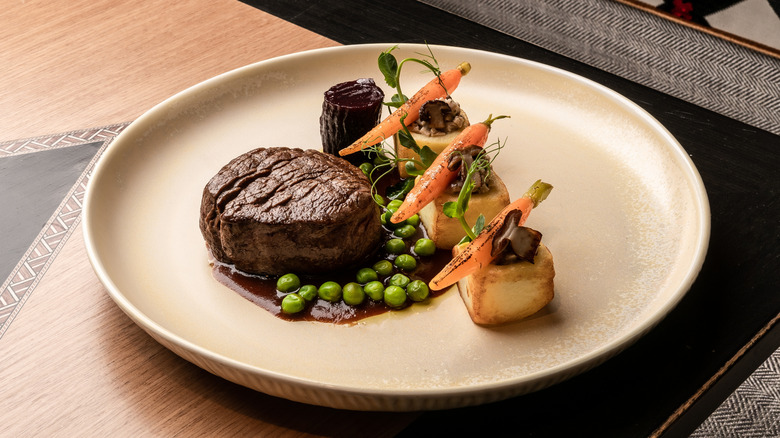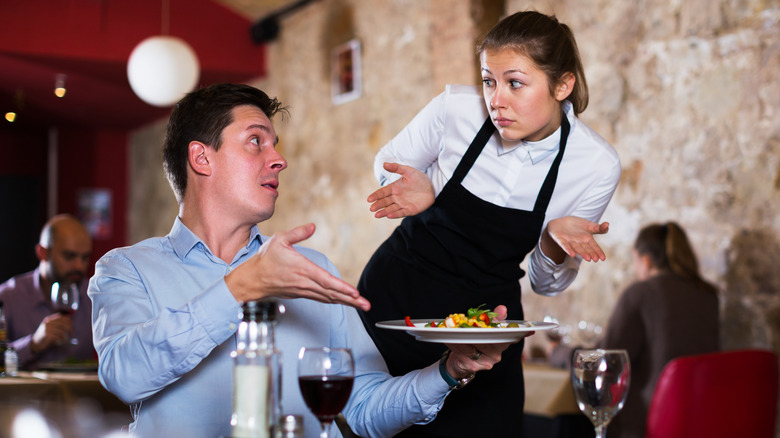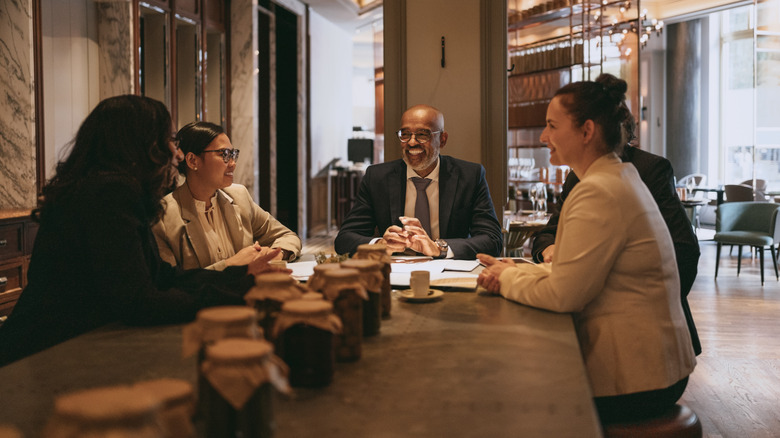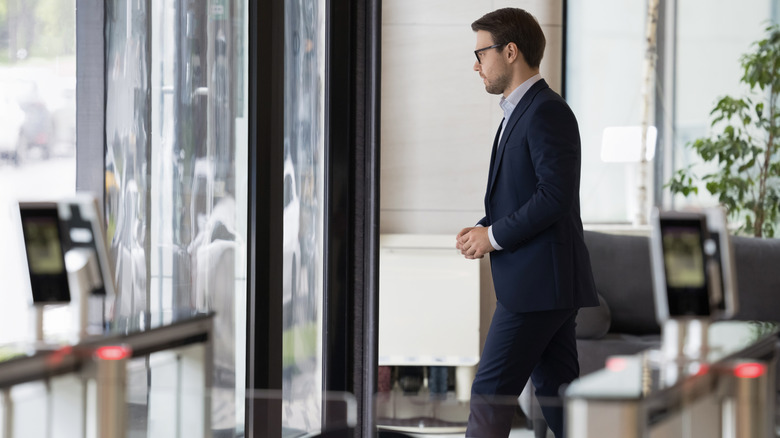15 Etiquette Mistakes To Avoid At A Business Lunch Or Dinner
You've been invited to a business lunch or dinner, and you want to impress. If you're doing this for the first time, it can be daunting. Or perhaps you've had one or two before and they haven't gone well. Whatever your situation, this is a list that will put your mind at ease. Making the right impression at a business meal can be vitally important. Depending on the situation, it can endear you to management, improve your network, or highlight your great work.
Doing well at these lunches or dinners can be your key to more business opportunities. If all that sounds intimidating, just remember that you're attending this lunch for a reason, and that's usually a positive sign. As long as you avoid these simple mistakes, it's hard to go wrong. After you get to the end of this list, you'll understand how to be professional and courteous at business meals. This will allow you to get through them smoothly without causing offense or having any awkward moments.
1. Arriving late (or too early)
Life happens, and being late to work sometimes seems unavoidable. However, before an important business lunch, you want to take every possible step to avoid this from happening. Even if you're just on time, being stressed on the journey isn't a good way to prepare. The ideal scenario is that you leave the office with the people you're having lunch with, but that may not happen. If you're traveling on your own, give yourself more time than you need. If you're taking public transport, get the train or bus before the one you think you need. Also make a contingency plan, such as if the train you were planning on taking gets canceled. If traveling by car, plan for the worst-case traffic scenario.
If you are late, you want it to be for an unquestionably good reason. By taking these steps, there is a good chance you'll arrive early at your destination. However, don't arrive too early either as this can inconvenience the host. They may be having a pre-meeting, or perhaps the others attending the meal want to catch up over a drink before sitting down. The rules here are slightly different from that of a dinner party, as you should aim to be there 5 to 10 minutes early. If you do find yourself earlier than this, wait in the lobby or somewhere nearby, such as a coffee shop.
2. Not following the dress code
Following a dress code is made even trickier these days. Many modern offices have a casual approach to work attire, but the place you're eating at may not. Getting the dress code wrong can send a message about your professionalism and attention to detail. This can easily be avoided by checking the dress code in advance. You can also casually ask the host of the dinner what you're expected to wear, if appropriate. There are other ways to get over this problem, such as simply getting in touch with the venue and confirming with them.
If it's a formal business setting, then it's best to wear a suit or smart business attire. In more informal settings, business casual may be appropriate. A neat appearance will always be respected, and if you're unsure, then it's better to err on the side of more formal wear. It will show you respect the occasion. If you get it all wrong, dressing formally for a casual lunch is a lot easier to brush off than dressing casually when you should have looked professional.
3. Using your phone
These days it can feel as though using your phone is second nature, and it's normal to reach into your pocket intermittently just to see if there are any new notifications. It's important to avoid this temptation during a business lunch or dinner. It's disrespectful to be on your phone and shows that your interest is elsewhere. There needs to be a specific reason to use your phone, such as to aid the conversation or for business purposes. For example, you may need to add a future meeting to your calendar, or you could be asked for information that's on your phone, such as someone's number.
Your priority should be on the people at your table, as you want to strengthen your professional ties, not undermine them. You should also keep your phone in your pocket, ideally on silent. If you are expecting an important call or message, then communicate this to your fellow diners. Even if the others at the table aren't showing the same respect, you should remain professional. Taking these actions will show your dining companions how much you value their time.
4. Eating too soon
Starting to eat your meal before everyone has been served is a classic etiquette mistake. It will leave a poor impression as it's seen as a sign of impatience and a lack of awareness for social norms. You should wait until everyone else has received their food before you think about picking up your fork. At any good restaurant, this shouldn't be an issue as all meals should be served in quick succession. There are rare exceptions to this etiquette. An example would be if another guest has returned their meal and wants everyone else to eat before their food gets cold.
Even if bread or appetizers are on the table, you shouldn't jump into helping yourself. Instead, wait until everyone is seated and settled and ideally, until someone else has started. You should see these business meals as an opportunity for conversation more than cuisine. It's best to go into them hungry but not with an empty stomach and desperate for food.
5. Ordering too much
You may naturally be a big eater, but ordering excessively at a business meal can come across as gluttonous or inconsiderate. This is especially true if someone else is footing the bill. You want to strike a balance between enjoying the meal and maintaining a professional attitude. If you feel as though this could be a problem for you, it may be a good idea to enjoy a light snack beforehand.
In addition, you want to avoid selecting the most expensive items on the menu. Doing so can make you look opportunistic if the meal is being covered by expenses, or rude if the bill is going to be split equally. As always, there are exceptions to this rule. For example, the host may want to show off by imploring you to get an expensive item they recommend. You want to match their tone and err on the side of caution and restraint. The same applies to appetizers, extras, and desserts. Wait for a collective agreement from the group before ordering anything more.
6. Drinking too much alcohol
Business lunches/dinners and alcohol have a complicated relationship. This is where you need to use your judgment and observation skills to gauge the mood. Of course, if you don't want to drink alcohol, then don't feel pressured and stick to your regular order. If you are an alcohol drinker, then overindulging can be a quick way to tarnish your professional image if you're not careful. Drinking too much too quickly can lead to poor judgment and inappropriate behavior. That includes finding it more difficult to follow all the tips listed here.
Sharing a drink or two can help to build rapport, ease conversation, and make you feel more comfortable if you're following the group. However, you should only drink if senior members of the group are also doing so. If you are drinking, be mindful of your tolerance and have some water alongside your alcohol. Finally, be mindful of the time of day and your responsibilities for the rest of it. If you need to go back to work, then leave the alcohol aside unless the host is upper management and excuses you from your commitments.
7. Not following the lead
As you may have noticed, there are exceptions to all of these rules, which can make it tricky. It's important to observe what's happening around you and follow the host's lead at all times. You also have to appreciate the tone of the meal. It could be lunch with upper management, a networking meal with a client, or perhaps a dinner with a potential new employer. One meal may be casual, and another more formal.
The host is expected to set the tone for the occasion, and you can use this to put your mind at ease. They'll be the ones to check whether everyone is ready to order, initiate discussion topics, and when to transition between business and casual chat. Ignoring these cues may annoy the host or come across as pushy. Without being too obvious, it's a good idea to mirror their choices in terms of type of drink and progression of food courses. Doing so will prove you are both considerate and professional.
8. Not following basic manners
When it comes to dining etiquette, there are many rules to follow. Some of them may be obvious, whereas others may be related to food you're not accustomed to eating. If you're wondering what these rules are, thankfully we have a handy guide for you. Not following basic manners is an obvious faux pas and showcases your lack of preparation and understanding. This may be taken as a sign you're not ready to be trusted with more responsibility.
Basic steps include not talking with your mouth full, using appropriate utensils, chewing with your mouth closed, and keeping elbows off the table. If you're eating a meal you're not used to, such as at a Chinese restaurant, make sure you know how to use chopsticks. Finally, try to stick to foods that are easy to manage. The likes of noodles or ribs may be your favorites, but they have a much higher chance of making you look awkward or causing a mess.
9. Interrupting others
It's understandable that you'd be excited about attending a business meal. Without trying to make you nervous, this could be a significant milestone in your career. This can make you desperate to make a good impression and get your ideas out there. However, you need to keep that excitement in check and speak at the right times. Speaking over others can derail a conversation and is simply rude. The person you spoke over is likely to instantly form a negative opinion of you.
Wait for natural pauses before responding. Speaking too quickly after someone else spoke will also make it seem as though you didn't care about what the person before you said. Just be patient. If you have something of value to say, then it doesn't need to be said immediately. It will have much more gravity and impact if you say it when there is a break and you've got everyone's attention.
10. Not practicing active listening
If you're desperate to get your point across, you may not properly listen to what others around you are saying. Active listening is when you attentively listen to what someone is sharing and respond in an appropriate way. An example of not doing this is when you impatiently wait for someone to finish speaking and respond with a point that doesn't acknowledge what they said. An example of good active listening would be to say something like: "That's a great point because of X. What would also help the company is Y."
If people notice that you're only pretending to listen, it will come across as inconsiderate or uninterested. You may also be asked about the business conversation at a later date. It's possible that you find it hard to listen properly due to nerves. If this is an issue, practice mindfulness to stay calm, such as breathing techniques. A simple trick is to maintain eye contact, nod along, add brief verbal gestures, and reference what they said when making your next point.
11. Discussing controversial topics
A business lunch or dinner is not the time to bring up controversial topics or ones that can sharply divide opinion. Subjects such as politics, religion, and social issues should be off the table, as they often spark strong opinions which can lead to tension or feeling alienated. Added to this, you should also avoid topics that make others uncomfortable, such as deeply personal issues, gossip, or comments on someone else's characteristics.
Such remarks can be seen as not only disrespectful but even discriminatory. This key tip also gives you a chance to shine. If someone else is making this mistake, you can craftily steer the conversation back to a more neutral topic. This will be appreciated by everyone else at the table. Industry trends and work are common subjects of interest, but you can also talk about positive personal stories or non-controversial hobbies. A business meal is a place to build connections and trust. If you start to make others uncomfortable with your conversation topics, that may not be possible.
12. Overly complaining
We're not telling you to avoid complaining here, far from it. In fact, if there are obvious signs that you should send back your meal, then that's exactly what you should do. Not doing so can make you seem meek and afraid of making uncomfortable decisions. However, you shouldn't complain excessively or argue about trivial matters. This can make you appear rude and someone who may be difficult to work with. If you do need to raise a complaint, then it should be done politely and discreetly. For example, if your food is significantly undercooked, then you should let the server know without making a scene.
However, if you ordered a medium-rare steak and it's slightly overcooked, ask yourself if it's worth making a fuss over. If you can live with the error and it's not apparent to others at the table, it's usually best to get on with your meal without appearing to be high maintenance. Remember, the main goal here is to build relationships. If your meal is good but not perfect, keep a positive demeanor.
13. Making money mistakes
Handling the financial aspect of a business meal can be tricky. You want to make the right impression by paying your share but equally, you don't want to offend. It's unusual that you'd be responsible for the bill if you're not used to business lunches, but if you are, make sure to give a generous tip. It's highly possible that the host is covering the bill, either out of their own pocket or as a business expense. However, you shouldn't presume this, or act entitled. It's best to offer to pay for your share of the meal if you're unsure and give a good tip.
It may be made clear to you beforehand how it's being paid but if not, you can ask someone else who is attending the meal. If the bill is to be split, offer a fair contribution. Unless you've bought more expensive items that increase your proportion of the bill, be content with splitting it equally between everyone. If you are responsible for a higher percentage of the bill, offer to pay more. You may insist on paying for the entire meal, but this can actually be rude and put the host in an uncomfortable position. Remember, there is no rush. If you're unsure, hang back and wait for cues about the payment from the other diners.
14. Not thanking the host
A simple yet important tip is to thank the host. There is a chance they got a secretary to arrange the meal and the bill is being charged to the company, but it's still good etiquette. They have taken time out of their schedule and invited you. It's an important moment and you want to seem grateful. It's best to keep this short and straightforward. You don't need a big show of gratitude and beautiful prose about how you really appreciate the invite.
Instead, a simple "thank you for lunch" is all you need. You can make additional positive comments such as how the food was lovely, the restaurant was excellent, or the view was fantastic. This will show your appreciation without it seeming inauthentic. If appropriate, you can send a follow-up thank you. For example, if you were asked to email a document following the meal, you can add a quick "thanks once again" at the end of it.
15. Leaving too soon
The last tip we have is that you shouldn't leave too soon. It will make everyone else at the table think that you have more important places to be and that you couldn't wait to leave. Of course, there could be a very good reason you need to leave, but if it comes up during the meal, then you need to communicate it properly. If you are already aware of needing to depart quickly following the meal, then it should be agreed upon beforehand. Otherwise, it's important to relax and wait for the host to naturally wind down the lunch or dinner.
If you want to leave but are waiting for cues, avoid checking your watch too frequently as this can make others feel uncomfortable. The end of the meal is often where important information is given such as the next steps on a project, the arrangement of a future meeting, or significant news. If you've made it to the end of the meal without making any of the mistakes above, you don't want to ruin it at the last hurdle. A well-executed business meal can be an important milestone in your career. If you follow all these steps, you'll be giving yourself the best possible chance of making the right impression.















